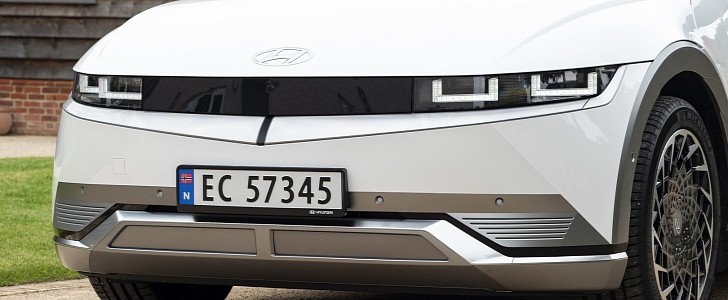South Korean giants Hyundai are looking to take the fight to Toyota on their home turf by returning to Japan 12 years after being forced to leave due to poor sales. Now though, a growing demand for electric vehicles is exactly the type of thing that might help the Korean brand re-establish itself in the region.
Hyundai will initially rely on its IONIQ 5 full electric crossover and the Nexo hydrogen fuel cell SUV, reports Reuters, but it’s likely that more electrified models will join the carmaker’s Japanese range in the coming years. One of Hyundai’s goals is to capture 10% of global EV sales by 2025 and expanding into other markets could prove crucial.
“We haven’t yet set a target for sales, but we will try to provide more information once we begin taking orders online in May,” said Hyundai Mobility Japan boss Shigeaki Kato, during a launch event in Tokyo.
Hyundai, together with Kia, first attempted to capture significant market share in Japan back in 2001 but were forced to leave after selling just 15,000 vehicles, despite dominating the South Korean market, while also proving extremely popular in several other global markets.
The fact remains that of the five million cars sold in Japan each year, roughly 90% come from Japanese brands, with Toyota holding down a 40% market share. Foreign brands have struggled to establish themselves there, apart from various luxury/exotic offerings.
Now that there’s a boom in demand for EVs, legacy manufacturers such as Hyundai, the VW Group and Stellantis might have a chance against Toyota in the latter’s “back yard”, so to speak. According to the Japan Automobile Importers Association (JAIA), imports of EVs went up three times to a record 8,610 units last year.
In a video message, Hyundai CEO Jaehoon Chang actually apologized for his company’s departure from Japan 12 years ago, while stating that only 600 Hyundai cars were still being driven there at the time.
In order to make sure things will turn out differently this time, Hyundai will be focusing its efforts on online sales, while also partnering with a car-sharing service and an insurance company – in turn, this will allow private car owners to rent out their vehicles.
“We haven’t yet set a target for sales, but we will try to provide more information once we begin taking orders online in May,” said Hyundai Mobility Japan boss Shigeaki Kato, during a launch event in Tokyo.
Hyundai, together with Kia, first attempted to capture significant market share in Japan back in 2001 but were forced to leave after selling just 15,000 vehicles, despite dominating the South Korean market, while also proving extremely popular in several other global markets.
The fact remains that of the five million cars sold in Japan each year, roughly 90% come from Japanese brands, with Toyota holding down a 40% market share. Foreign brands have struggled to establish themselves there, apart from various luxury/exotic offerings.
Now that there’s a boom in demand for EVs, legacy manufacturers such as Hyundai, the VW Group and Stellantis might have a chance against Toyota in the latter’s “back yard”, so to speak. According to the Japan Automobile Importers Association (JAIA), imports of EVs went up three times to a record 8,610 units last year.
In a video message, Hyundai CEO Jaehoon Chang actually apologized for his company’s departure from Japan 12 years ago, while stating that only 600 Hyundai cars were still being driven there at the time.
In order to make sure things will turn out differently this time, Hyundai will be focusing its efforts on online sales, while also partnering with a car-sharing service and an insurance company – in turn, this will allow private car owners to rent out their vehicles.








